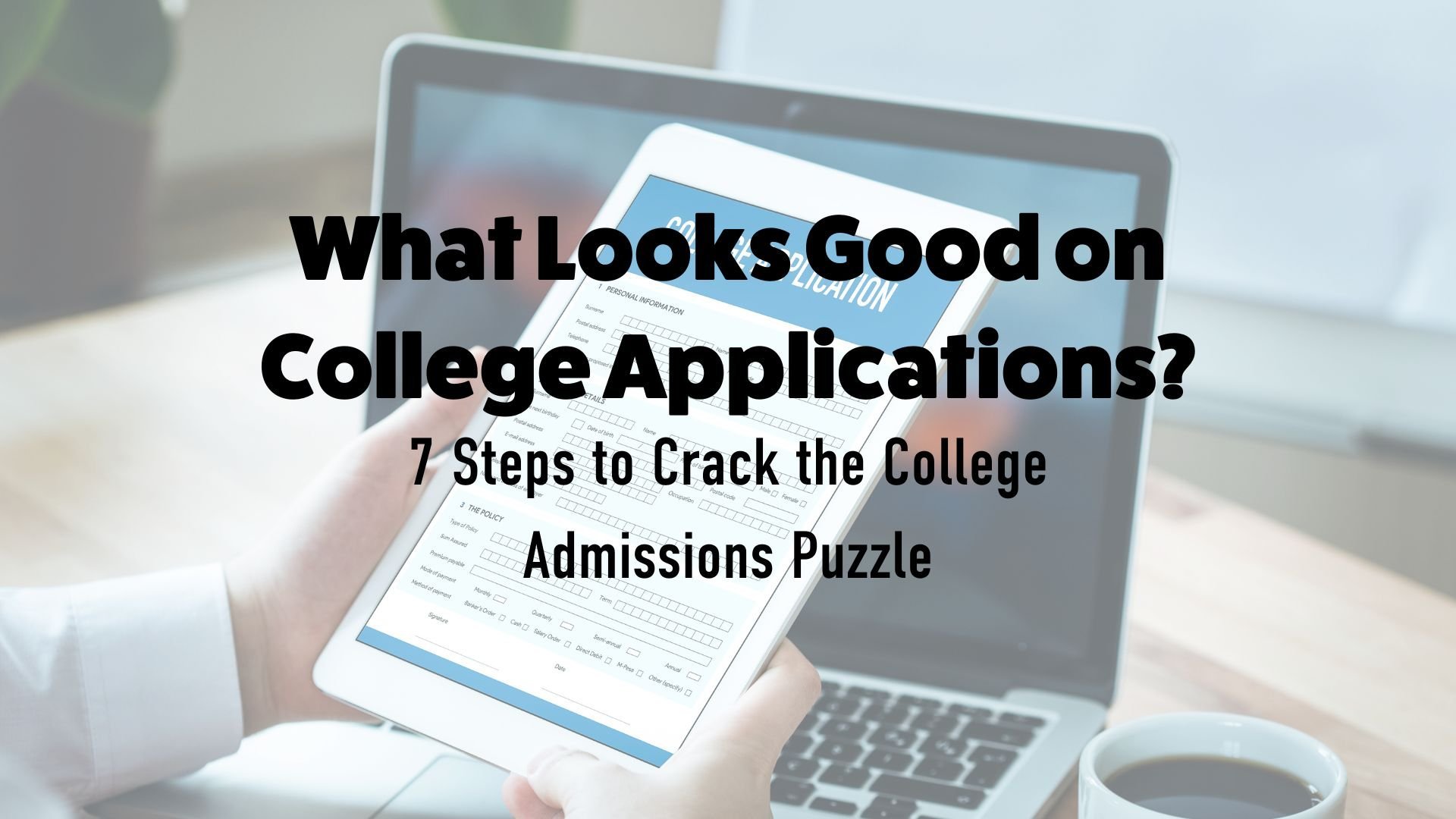What Looks Good on College Applications? 7 Steps to Crack the College Admissions Puzzle
Amidst significant changes to the college application process in recent years, high school students may be wondering what looks good on college applications. Are SAT scores still important as several top universities go test-optional? Where should I focus my efforts as I approach college applications?
For answers to these questions and more, look no further than this comprehensive guide on all the variables to consider as you enter college application season. Whether you’re a senior anxious to submit the perfect application to your dream school or an underclassman looking to get a head start on college application prep, the following tips will be useful to your college application process wherever you are in your high school journey.
1. Think about your narrative
One of the most important elements of a successful college application is the personal statement. This is your chance to tell your story up to this point in your life! If you are approaching a college essay for the first time as a senior, think about the experiences that have had the greatest impact on you. Are there extracurriculars in which you have participated in for several years? What might you say about your development over a longer period of time?
As an underclassman, you might consider how you can tell this story through your extracurricular involvements. Think of your academics, hobbies, and other activities as a constellation of plot points that tell the story of you! After all, a college application is really a school’s chance to get to know you as a person––what would you want someone meeting you for the first time to know about you?
For example, if you were interested in the spread of misinformation and how responsible journalism could tackle this issue, you could develop a project to investigate this question. Or what if your passion lay in improving the experience of your favorite sport? Is there a way that you could put this unique interest on display? As you pursue your interests, whatever they may be, think about how they fit into the broader narrative of your life and how you might convey this narrative on a college application.
2. Stick to your guns
Wherever your interest lies, explore that field to the deepest extent you can. Try not to let the question of what looks good on college applications guide your every activity and instead focus on how you can develop useful skills that will contribute to your curiosity in your field of choice.
Colleges are interested in high school students who demonstrate commitment. By participating in an extracurricular, be it a sports team or a service program, year after year, you are displaying reliability and a dedication to improvement.
As you look to discover your specific interests, start with questions that interest you and then assess how skills such as coding, programming or statistics might allow you to dive deeper into your favorite subjects. There are always opportunities to supplement your love for playing an instrument or creating digital art, for example, with hard skills like scientific inquiry or artificial intelligence.
3. Look for internships in your area of interest
If you’re looking for a way to clearly demonstrate your interest in a particular field of study, try finding an internship in which you can develop a track record of professional experience and continue to learn skills that are relevant to your domain.
Though it can be difficult to secure an internship as a high school student, there are several ways that you can increase your odds of landing a position that will enhance your college application.
Be proactive about seeking out opportunities. Take advantage of online resources to get a sense of all the possibilities available to you.
4. Form deep relationships
Besides your personal statement, one of the core elements of your college application that will speak to who you are as a student and a person is your letters of recommendation. Most often these will come from teachers who have a good sense of your academic ability or of your growth and effort in a particular subject. But letters of recommendation do not have to be limited to your instructors.
The key here is to really get to know your letter writers, so they have a chance to get to know you! Other figures who can serve as compelling letter writers include project mentors, athletic coaches, academic advisors, and employers. Think about who might be able to best speak on your behalf and continue to forge a strong connection with them.
5. Don’t be afraid to volunteer
While internships can be very competitive for high school students, many organizations are constantly in search of enthusiastic volunteers. Compared to internships, you might not think that volunteer experiences look good on college applications, but a sustained involvement with a service organization, especially with tangible results, can be an invaluable attribute of a successful college application.
Moreover, volunteer engagements can be a great way to meet adults with a wealth of experience in various different careers. Try to learn about their journeys. Often these connections can lead to other opportunities including work and shadowing experience!
6. Balance your academic workload
In general, colleges are interested in students who challenge themselves with their academic workload. This does not mean that you must curate a schedule that is unbearable and take every AP class that is available to you, but it does mean that you should assume that your junior year will be more difficult, as this is the time when most AP classes are offered.
At the same time, it is important to put your academic efforts in perspective with the other elements of your college application. Anticipate how much time each class in your course load will account for and study time and assess whether you will still have time for your important extracurricular activities.
Don’t be afraid to ask for help in your harder classes. Explore options for further practice in a subject with which you are struggling, including tutoring and online educators like Khan Academy. Ultimately, successful college applicants will have demonstrated an ability to muscle through difficult material and a dedication to maintaining a high academic standard.
7. Start a personal project
Sometimes students have unique interests that don’t seem to fit in cleanly with preexisting organizations and it can thus feel difficult to develop their interests further. In these cases, high school students should not feel shy to start their own projects that seize on their passions and create outputs that are potentially socially impactful.
Often, these kinds of self-started projects are the ones that most impress readers on college applications. They demonstrate drive and initiative, as well as a persistence to see a project through to its end goal.
At Inspirit AI, high-achieving graduate students and industry professionals from top universities provide high school students with mentorship and support to make these projects a reality. They guide motivated high schoolers through the research process and help them produce a project and presentation of which they can be proud, and which can be a major boost to their college applications.




